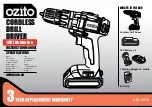
1.1. GENERALSAFETY
Follow all workshop safety rules, regulations and conditions when using the wrench.
Remove the battery pack from the wrench before servicing or performing any maintenance.
Maintain the
wrench and battery pack in good condition.
Replace or repair damaged parts.
Use an authorised service agent and recommended parts only. Unauthorised parts may be dangerous
and will invalidate the warranty.
Ensure the wrench is in ‘neutral’ before installing the battery pack.
Keep the wrench, battery pack and charger clean for optimum performance.
Keep the work area clean and tidy and free from unrelated materials. Ensure that there is adequate lighting.
Ensure that battery pack is correctly fitted to the wrench handle and latched in place before operating wrench.
WARNING!
When working around vehicle brake systems we recommend that you wear suitable respiratory protection due to
the possible presence of asbestos dust from brake linings.
Use only impact sockets which are specifically designed for use with an impact wrench.
Avoid unintentional starting.
Wear approved safety eye/face shield, ear defenders and hand protection.
Remove ill-fitting clothing. Remove ties, watches, rings and other loose jewellery and contain long hair.
Maintain correct balance and footing. Ensure the floor is not slippery and wear non-slip shoes.
Keep children and unauthorised persons away from the work area.
DO NOT
operate the wrench if any parts are missing as this may cause failure and/or personal injury.
DO NOT
use the wrench unless you have been instructed in its use by a qualified person.
DO NOT
operate the wrench where there are solvent fumes or flammable gases, liquids or solids.
DO NOT
leave the wrench operating unattended.
DO NOT
carry wrench with your finger on the trigger. Keep direction switch in ‘locked’ position when not in use.
DO NOT
use the wrench for a task it is not designed to perform.
DO NOT
operate the wrench when you are tired or under the influence of alcohol, drugs or intoxicating medication.
DO NOT
get the wrench or battery charger wet or use in damp or wet locations.
Keep wrench and charger in the case and store in a safe, dry, childproof area where the temperature will not exceed 104°F (40°C).
1.2. BATTERY SAFETY INSTRucTIONS
WARNING!
The battery pack contains nickel-cadmium which is dangerous. It must therefore be handled with care.
Charge the battery pack prior to first use. The battery pack will have been shipped in a low charge state.
Use only the charger provided to charge the battery pack.
DO NOT
charge the battery pack when room temperature is below 50°F (10°C) or above 95°F (35°C).
DO NOT
attempt recharging the pack by means of an engine generator or a DC power source.
DO NOT
short-circuit the battery pack by touching both terminals at the same time with a metal object, or your fingers etc.
DO NOT
store battery pack (or wrench) in locations where the temperature may exceed 104°F (40°C ) e.g. in outside sheds, above
heaters etc.
WARNING!
Dispose of spent battery pack correctly as it contains nickel-cadmium.
DANGER!
DO NOT
attempt to disassemble the battery pack. For safety and environmental reasons
DO NOT
discard in domestic
waste or by burning. ONLY discard or recycle according to local authority regulations.
WARNING!
DO NOT
allow a leaking battery to contact your person. If you come into contact with battery liquid take the following
immediate action:
a) Skin contact:
Wash immediately with soap and water, then wash in either lemon juice or vinegar.
b) Eye contact:
If acid enters eye, flush eye immediately with cool, clean running water for at least 15 minutes and seek immediate
medical attention.
1.3. MAINS POWER ELEcTRIcAL SAFETY (Relating to battery charger)
WARNING! It is the user’s responsibility to check the following:
You must
check all electrical equipment and appliances to ensure that they are safe before using.
You must
inspect power
supply leads, plugs and all electrical connections for wear and damage.
You must
ensure the risk of electric shock is minimised
by the installation of appropriate safety devices. An RCCB (Residual Current Circuit Breaker) should be incorporated in the
main distribution board. We recommend that an RCD (Residual Current Device) is used with all electrical products. It is
particularly important to use an RCD with portable products that are plugged into a supply not protected by an RCCB. If in doubt
consult a qualified electrician. You may obtain an RCD by contacting your local Sealey dealer.
You must
also read and understand the following instructions concerning electrical safety.
1.3.1. The
Electricity At Work Act 1989
requires all portable electrical appliances, if used on business premises, to be tested by a qualified
person, using a Portable Appliance Tester (PAT), at least once a year.
1.3.2. The
Health & Safety at Work Act 1974
makes owners of electrical appliances responsible for the safe condition of the appliance and
the safety of the appliance operator.
If in any doubt about electrical safety, contact a qualified electrician.
1.3.3. DO ensure that the insulation on all cables and the product itself is safe before connecting to the mains power supply. See 1.3.1.
above and use a Portable Appliance Tester (PAT).
1.3.4. DO ensure that cables are protected against short circuit and overload.
1.3.5. DO regularly inspect power supply leads, plugs and sockets for wear, damage or loose connections.
InSTRUCTIOnS FOR:
MODEL no:
cP3004
Thank you for purchasing a Sealey product. Manufactured to a high standard this article will, if used according to these instructions and properly maintained,
give you years of trouble free performance.
1. SAFETY INSTRucTIONS
IMPORTANT:
PLEASE READ THESE INSTRucTIONS cAREFuLLY. NOTE THE SAFE OPERATIONAL REQuIREMENTS, WARNINGS AND
cAuTIONS. uSE THIS PRODucT cORREcTLY AND WITH cARE FOR THE PuRPOSE FOR WHIcH IT IS INTENDED. FAILuRE TO DO SO MAY
cAuSE DAMAGE AND/OR PERSONAL INJuRY AND WILL INVALIDATE THE WARRANTY. PLEASE KEEP INSTRucTIONS SAFE FOR FuTuRE uSE.
cORDLESS IMPAcT WRENcH 19.2V 1/2”sq DRIVE SuPER TORQuE cONTROL 400lb.ft
Original Language Version
CP3004 Issue: 3 - 05/01/12






















